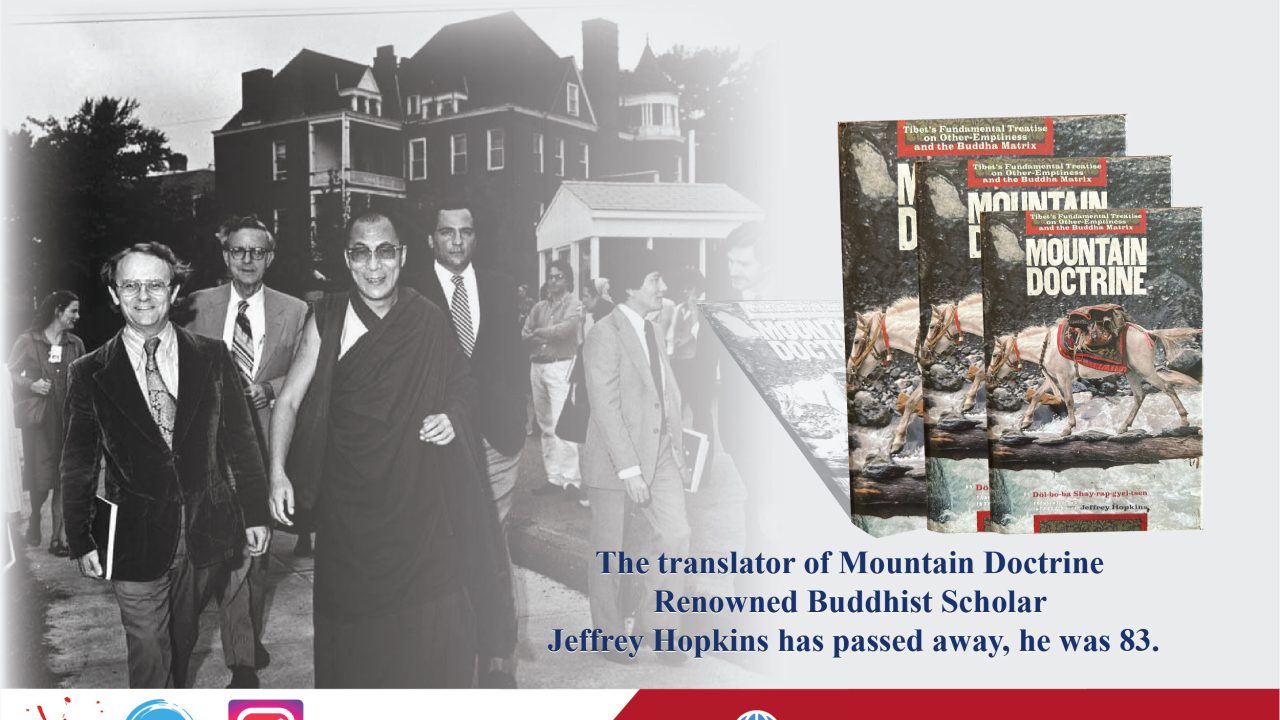Jeffrey Hopkins (1940 – July 1, 2024) was an American Tibetologist. He was Emeritus professor of Tibetan and Buddhist Studies at the University of Virginia, where he taught for more than three decades beginning in 1973. He authored more than twenty-five books about Tibetan Buddhism, among them the highly influential Meditation on Emptiness, which appeared in 1983, offering a pioneering exposition of Prasangika-Madyamika thought in the Geluk tradition.
From 1979 to 1989 he was the Dalai Lama’s chief interpreter into English and he played a significant role in the development of the Free Tibet Movement. In 2006 he published his English translation of a major work by the Jonangpa lama, Dolpopa, on the Buddha Nature and Emptiness called Mountain Doctrine.
Jeffrey Hopkins, a brilliant scholar, author, teacher, and translator who founded one of the largest Tibetan Buddhist Studies programs in the West, died on July 1 in Vancouver, Canada. He was 83.
For more than three decades, beginning in 1973, Hopkins was a leading light at the University of Virginia. He directed UVA’s Center for South Asian Studies for twelve years and taught Tibetan Buddhist studies and Tibetan language for thirty-two years, but his signature achievement was the Tibetan Buddhist studies doctoral program he established in 1975, which became the largest in North America. Among its graduates are some of the most esteemed academics in the field today, including Anne C. Klein of Rice University, Donald Lopez of the University of Michigan, Georges Dreyfus of Williams College, and Bryan Cuevas of Florida State University.
Hopkins’s singular force was evident from the moment he arrived at UVA in 1973. Lopez, a senior when Hopkins joined the faculty,
During his career, Hopkins also held visiting professorships at the University of Hawaii and the University of British Columbia. After he retired from UVA, he focused on translating. He was the founder and president of the UMA (Union of the Modern and Ancient) Institute for Tibetan Studies and from 2011 directed its Great Books Translation Project, set up to make Tibetan texts freely available.
One of the most respected Tibetologists of his generation, Hopkins authored, edited, or translated more than fifty books. His extensive published work includes scholarly books on emptiness and tantra,
In 1979, Hopkins was instrumental in arranging His Holiness the Dalai Lama’s first visit to the United States and served as his chief translator from 1979 to 1989 on tours of the US, Canada, Europe, Southeast Asia, and Australia. Hopkins translated and edited His Holiness’s teachings for sixteen books, including The Dalai Lama at Harvard, along with titles aimed at a general audience, such as Kindness, Clarity and Insight; How to See Yourself As You Really Are; How to Practice: The Way to a Meaningful Life, Mind of Clear Light, Mind of Clear Life: Advice on Living Well and Dying Consciously; How to Be Compassionate; and How to Expand Love: Widening the Circle of Loving Relationships.
Hopkins also published the first translation of a foundational text of the Jonang school of Tibetan Buddhism, famous for its “other emptiness” Mountain doctrine.
Those who knew Hopkins as an academic powerhouse were often surprised to learn of another compelling interest: sex, including gay sex, and its role in Buddhist practice. This was the subject of Hopkins’s chapter titled “The Compatibility of Reason and Orgasm in Tibetan Buddhism: Reflections on Sexual Violence and Homophobia,” in a 1993 book, Gay Affirmative Ethics, and of his own 1995 book, Sex, Orgasm, and the Mind of Clear Light. Subtitled The 64 Arts of Gay Male Sex, it is a reworking of 1992’s Tibetan Arts of Love, a Hopkins translation of a 1939 work on passion and sex play by Gendun Chopel, a scholar, poet, and former monk.
Hopkins discussed sex and Tibetan Buddhism with psychotherapist and author Mark Epstein for Tricycle‘s Summer 1999 issue. Noting that many tantric practices call for envisioning oneself as a dakini [female embodiment of enlightened energy], Epstein asked Hopkins why he felt it necessary to “retranslate a text with heterosexual imagery into a specifically gay manual.” Hopkins, who was very open about his homosexuality and had led Buddhist retreats for gays, replied, “I did this in order to support one of my own communities—an important one. I felt I would be betraying them if I did not. It might have looked as if I was hiding. I am not.” He further explained, “I’m not necessarily talking about the practice of tantra but of using ordinary sex as an opportunity to do something that’s like what’s done in tantra.”
